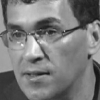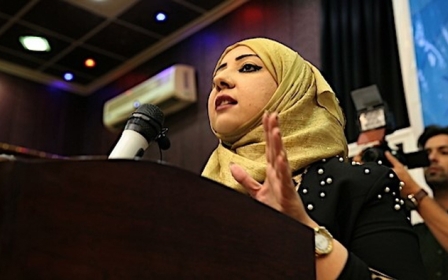Iraq needs a majority government that will actually govern

The Iraqi parliamentary election was full of surprises, both good and bad.
Most disappointing by far was the low turnout, estimated by the official body responsible for organising the election, the Independent High Electoral Commission (IHEC), at 44.5 percent of 24.5 million eligible voters, a figure disputed by others who put it somewhere between 19 and 26 percent.
All mooted turnout figures are significantly lower than those given for the previous elections of 2010 and 2014, respectively estimated at 62.5 percent and 60 percent.
This voter apathy is a sign of a public disillusioned with its self-centered and woefully under-performing political class. If deepened, it could shatter Iraq's fragile democracy. This might also raise the dangerous prospect of non-peaceful attempts to transfer power, in a country with a long history of violent takeovers.
Better-informed choices
The voter fraud allegations in Sunni and Kurdish-populated areas are another worrying sign. In Shia-populated areas, though, these allegations were largely absent and the new electronic voting system ensured a relatively fast delivery of results, which helped eliminate much of the fraud present in previous elections.
The IHEC's failure to have the system's reliability checked by an international company prior to the election, as well as the seemingly chaotic state of affairs within IHEC, fuelled grossly exaggerated suspicions of widespread and result-changing vote-rigging.
With the exception of the Iraqi Kurdistan Region (IKR) and Kirkuk, where available evidence suggests potentially serious vote-buying and rigging and the four opposition parties have rejected the results, the election seems to have gone relatively smoothly.
The good news is that Iraqi voters made better-informed choices this time, mostly punishing many of the old-guard politicians who are widely perceived to be responsible for the post-2003 failures. The new parliament is mostly made up of new faces. The "renewal" theme that dominated the election rhetoric, reflecting a popular mood for change, was partially borne out by the results.
The good news is that Iraqi voters made better-informed choices this time, mostly punishing many of the old-guard politicians widely perceived responsible for the post-2003 failures
Iraqis also voted for ideas as much as for identity, usefully weakening the hold that sectarian identity had on voter choices in previous elections. One telling surprise is that the Shia-dominated electoral list of Prime Minister Haider al-Abadi came first in Nineveh, whose capital is Mosul, the most populous Sunni province in Iraq. Abadi's Victory Alliance could not achieve a similar result in any of the Shia-dominated provinces, and came second in Salahuddin province, another Sunni stronghold.
The Shia vote was the most surprising of all. Muqtada Al-Sadr's list, a pro-reform alliance of moderate Iraqi nationalists composed of Sadrists and seculars, came first with 54 seats. It was followed by its ideological foe, a pro-Iran, conservative Islamist alliance championing the cause of the Popular Mobilisation Units (PMUs) as Iraq's recent liberator and future defender. It picked up 47 seats.
The universally anticipated front-runner, Abadi's list, which had the widest national appeal in the pre-election period as well as a proven success record, unexpectedly came third with 42 seats. A parliamentary coalition of at least 165 members is needed to nominate the prime minister and form the government. This means many rounds of negotiations among several lists are expected in order to put together this coalition.
Ethno-sectarian acceptability
Despite the fact that his list came third, Abadi has a clear advantage: he is a tried-and-true prime minister. One challenge in successfully nominating a new prime minister is that they should meet Iraq's high standards of ethno-sectarian acceptability, together with positive name recognition and the absence of Iranian and American vetoes. Few Shia politicians can meet this high mark.
This election's most important lesson is that Iraqi voters wanted new blood in the political machine and, for the most part, got it. Beyond changing representation, the results dealt a potentially serious blow to the catastrophic identity-driven consociational politics that have dominated Iraq since 2003.
This election's most important lesson is that Iraqi voters wanted new blood in the political machine and, for the most part, got it
But if old habits are going to die in Iraq, they will die hard. General Qassem Suleimani, Iran’s top man on Iraq, was in Baghdad last week meeting with the heads of Shia lists, including Abadi, trying to assemble a Shia ruling alliance with a consensus candidate for the premiership.
He was merely following "tradition" in how previous governments were formed, when assembling the ruling ethno-sectarian coalition was more important than the programmes and policies that inform how the coalition would rule. He failed.
This Iranian failure gives momentum to Sadr's alternative vision: a cross-sectarian ruling coalition based on refromist policies, implemented by a government of technocrats, aiming at state-building measures that include tackling corruption, overhauling the economy and public services, curtailing partisan appointments as a way to depoliticise state institutions, fixing the judiciary, and dismantling Popular Mobilisation Units (PMUS) and militias.
A very daunting task, this essentially means undoing the politics of consensus and ethno-sectarian power-sharing that have dominated the country since 2003.
Return to ethno-sectarian politics
This scenario includes Abadi as a second-term prime minister. But with 95 seats combined, the two lists need to get other partners who are ready to forsake divvying up state resources for a say in decision-making.
Some have already done so, like Ammar Al-Hakim's "Wisdom" list, which has 20 seats. Sharing a similar reform agenda and having worked well together since 2014, Abadi and Sadr should reach out to Sunnis and Kurds by offering them the same deal: participation in decision-making with no state patronage.
One consequence of the election is Iran's weakened influence over the government-formation process, since Iraqi nationalist Shia lists were the ones that carved the largest chunk of the vote. The US should take advantage of this, get over its fears of Sadr and be proactively involved in negotiations with its Iraqi allies and friends to help Sadr and Abadi form this cross-sectarian governing alliance.
What should be avoided is a government made up of all major lists, with cabinet members as political appointees picked by those same lists. That would be a return to the old failed ethno-sectarian politics that Abadi and Sadr routinely criticised and vowed to dismantle.
Iraq needs a majority government that has a clear state-building reform agenda, with an opposition that challenges the government by exposing its failures and proposing remedies. This is far better than the past model of spoils-sharing governments in the name of consociational democracy.
- Akeel Abbas is an Iraqi academic and journalist. He currently teaches at the American University of Iraq at Sulaimanya(AUIS), and holds a PhD in cultural studies from Purdue University.
The views expressed in this article belong to the author and do not necessarily reflect the editorial policy of Middle East Eye.
Photo: An Iraqi man celebrates with a picture of Shiite religious leader Muqtada Sadr during the general election in Baghdad on 14 May, 2018 (AFP)
Middle East Eye propose une couverture et une analyse indépendantes et incomparables du Moyen-Orient, de l’Afrique du Nord et d’autres régions du monde. Pour en savoir plus sur la reprise de ce contenu et les frais qui s’appliquent, veuillez remplir ce formulaire [en anglais]. Pour en savoir plus sur MEE, cliquez ici [en anglais].






